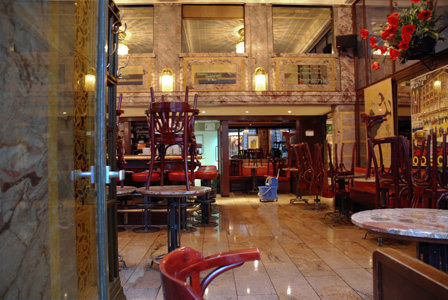Uriel Orlow
[...] In his series of works based on the Café Odeon, Uriel Orlow presents us with a film's exploded elements: shards of research, location scout-ing, casting. The characters, the café's denizens, are rendered as iconic pin-ups, but while some are immediately recognisable - Brecht, Lenin, Einstein - many remain intransigently unfamiliar. Meanwhile the café itself decomposes into its elements: its illustrious history becomes untethered from its physical facts, its marble and wood, which seem to open up onto their own more primeval histories. These moments of close attention to surfaces and materials - of "vulgar materialism”, as Lenin might have put it - represent a limit, the point at which we must ask what really constitutes this place: can mere matter have a history? [...] Orlow's challenge to our desire for continuity is radical: the truth of this peripheral space is not one, he suggests, that can be told narratively. In an era where every fashionable bar flaunts the supposed history of its space (usually now-displaced manufacturing), Orlow's work asks us how we can read the past in a way which does not involve a simple hierarchy with the present. More than this: he wants to know what history is and how it binds itself to an institution, a thing, a space, a face. These faces in the drawings are not there simply to be named, identified; their self-evidence is an enigma. The fragility of the whole project is its fidelity to its subject's fractured nature, which demands that it run the risk of a certain kind of silence. [...] Mike Sperlinger
Artistes
| Details | Name | Portrait |
|---|---|---|
| Uriel Orlow |

|

